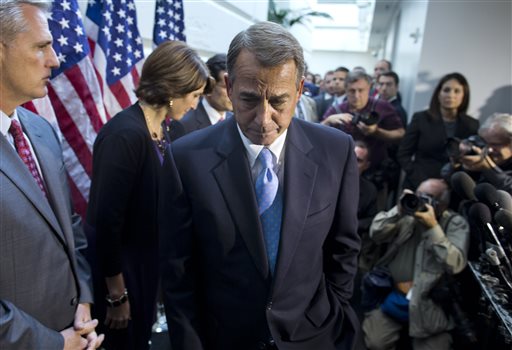The House has yet to vote on Republican leaders’ proposed bill for ending the government shutdown and the debt ceiling fight. The GOP, having entered aiming to defund Obamacare and reach some agreement on major budget changes, now merely hopes that the Democrat-controlled Senate and the White House will accept the Vitter amendment to remove Obamacare subsidies from Congress, its staff, and political appointees.
The polls have been bad for both parties, and the president as well. But Republicans are receiving more of the blame. Yet there are a few gains the GOP can claim, even while taking some losses. Here are the bad and good:
Losses
1. Political momentum. Barring any last-minute upheavals, Obama and the Democrats will emerge as the big political winners–so say the media, at any rate–and will carry their political momentum into the new year and the 2014 midterm fight. Though there is little chance that Republicans will lose control of the House of Representatives, the GOP’s hopes for winning back the Senate may have dimmed somewhat.
2. Party unity. The Democrats kept their caucus together, for the most part, and will feel a new sense of confidence in Obama’s strength as a leader–something they have not felt all year long. Meanwhile, the GOP has rarely been more disunited. With centrist Republicans hurling leftist epithets at the Tea Party, and the conservatives accusing moderates of surrender, John Boehner’s speakership may be damaged beyond repair.
3. Voter confidence. Not only have Republicans lost, so to speak, to the Democrats, but the party base will not even give them credit for trying. The party often appeared to be negotiating against itself, and will–as in the previous debt ceiling fight, and the fiscal cliff–be jeered by the conservative media for not holding firm. Expect some primary challenges in 2014. And expect some parts of the party’s core voter base to stay home.
4. Damaged leaders. Boehner is not the only Republican leader who has bruises. Ted Cruz rallied the Tea Party around his bold stance on Obamacare, but irritated his colleagues and the party’s center. Reports that he did not have a political strategy, fair or unfair, have damaged him. Rand Paul once claimed the GOP was “winning”–a comment that appeared mildly insensitive at the time and downright wrong in hindsight.
5. Tarnished brand. The old nasty rhetoric from 2011 re-emerged, but worse: “arsonists” and “kidnappers” were added to the usual characterizations of “terrorists” and “hostage-takers.” Democrats even earned a rare bonus point when one person–all it takes!–showed up at a protest with a Confederate flag, encouraging the media to place renewed faith in their repeated bogus mantra of Tea Party and Republican racism.
Gains
1. Obamacare in focus. The conventional wisdom is that Republicans stepped on their own message. The problem with that argument is that the party’s message had been focused on immigration (see #3, below). It is precisely because of the Obamacare fight that people like Jon Stewart knew about the demand for a one-year delay in the individual mandate. Voters now believe a GOP Congress really might repeal the law.
2. Obama’s cruelty. It quickly became clear that the Obama administration intended to make the shutdown as painful as it possibly could, shutting veterans out of open-air monuments and the like–an effort that surely cost more than it saved. In addition, President Obama constantly talked down the stock market, hoping that big losses would increase his negotiating leverage. Politics before patriotism, personified by the president.
3. Immigration reform sidelined. Since August, some Republicans and amnesty advocates had touted the beginning of October as the climax in their campaign for “comprehensive” immigration reform. But when the rally took place on the Mall, the media barely noticed. Immigration activists, outraged, began to plan more aggressive tactics. Yet the policy–more divisive among Republicans than the shutdown–stalled.
4. Obama’s decline. The mainstream media focused, naturally, on what the debate was doing to drive the GOP’s poll numbers down. But President Obama’s numbers crashed as well–reaching a low approval of 37% in an AP poll–and will only recover slowly. The public may have priced in Republican opposition by now. What it started to realize in October was just how little interest Obama has in his core governing responsibilities.
5. Life beyond government. The government shut down–and life continued. The default loomed–and yet the markets refused to panic. The country existed before the government and exists in its (relative) absence. Though Republicans will not court another shutdown anytime soon, the public has learned not to fear a short-term loss of “non-essential” services. That, in a subtle but important way, is a blow for freedom.

COMMENTS
Please let us know if you're having issues with commenting.